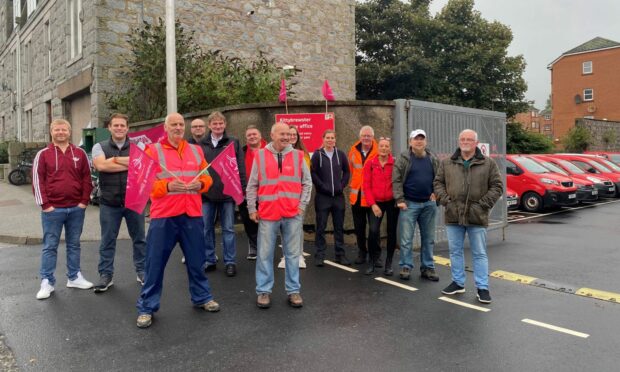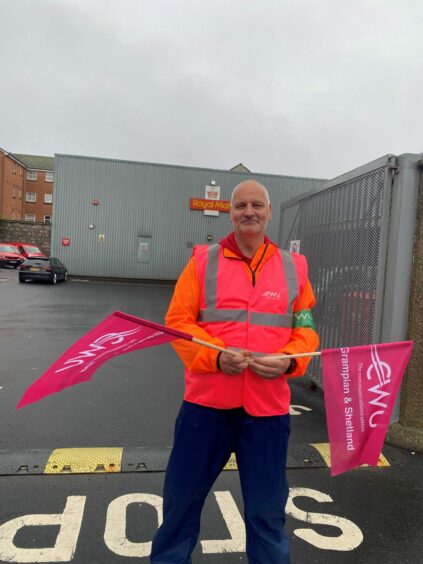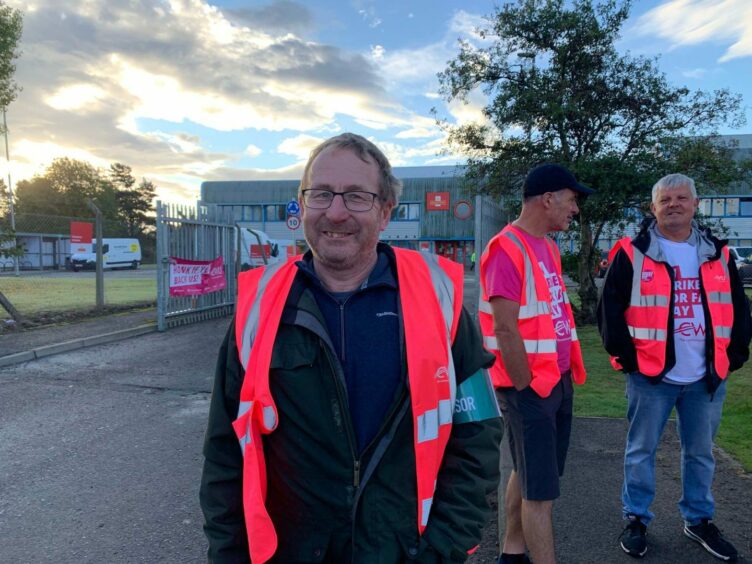Picket lines have again been formed across the north and north-east as postal workers continue to strike over pay.
Households throughout the country are feeling the pinch of the cost of living crisis, leading workers in key sectors including post and waste collection to strike.
The Communication Workers Union’s (CWU) 115,000 workers formed picket lines last month in what was called the biggest strike of the summer and are in the midst of staging another 48-hour walkout over Thursday and Friday.
Royal Mail has proposed a 2% pay rise and has reportedly sent letter to all its workers urging them to return to work.
One staff member in Inverness called the letter “threatening”, and the feeling among postal workers is that a 2% rise is not reflective of their hard work.
A further two days of strikes have recently been announced for September 30 and October 1.
We took to the picket lines on Thursday morning to speak to those striking.
Martin MacGregor
Martin MacGregor drives about 180 miles around the Highlands while on shift, delivering as far south on the A9 Perth road as Dalwhinnie.
He stands on the picket line in Inverness as a representative for the drivers battling the elements and dangerous road conditions to deliver mail.
The 52-year-old said in all his 30 years with Royal Mail, he has never seen a strike be so well attended.
He said: “A 2% pay rise isn’t good enough for anybody. A lot of strikes in the past have been quite sporadic but on this occasion it has been incredible.”
Mr MacGregor said he was “fortunate” to have paid off his mortgage, but that the hiking price of his household bills were “bananas”.
He added that cost cutting by Royal Mail has meant those who rely on postal workers for more than just delivering mail are being left behind.
“If you’re an old person waiting on a letter from your friend, you get that letter and it brightens up your day,” he said.
“It’s about more than just making profit.”
John Innes
John Innes has worked for Royal Mail in Aberdeen for 20 years and believes things have steadily been getting worse.
The 56-year-old said he was at the Kittybrewster picket line because workers are being treated as though they are “just a number” while the company prioritises shareholders.
He said: “we’re on strike for fair pay, and the next couple of strikes will be on terms and conditions.
“They want us to give away all our rights basically for no cash, make Sundays compulsory and annualised hours.
“They keep telling us they’ve got no money to give us a decent pay rise and yet they can give over half a million to shareholders.
“We’re just a number now. Once you’re no longer any use they want you out the door.
“It’s just been getting steadily worse over as soon as it got privitised it’s been all about the shareholders.”
Garry Stuart
Despite having worked for Royal Mail for more than 18 years, Garry Stuart said he has only failed to deliver mail on one day due to extreme weather.
Shifts used to be around two and a half hours long but have more than doubled, meaning workers are out in blazing sun and freezing cold for longer.
Mr Stuart agreed with Mr MacGregor that postal workers in the Highlands act as a lifeline for those who would otherwise be isolated.
“You’re speaking to people who you can tell haven’t spoken to anyone else for days,” he added.
“We were told years ago we were meant to take time to speak to the public. Without us, these people become more vulnerable.”
Though he has been relatively happy in his role until recent years, Mr Stuart is now considering leaving because of poor pay.
“I can go and flip burgers for more money per hour and I’d be fed and inside,” he said.
“I would work normal hours, I’d be dry and not getting chased by seagulls or dogs.”
Robbie McIlwraith
Robbie McIlwraith is branch secretary for CWU in the Highlands and said today’s strike turnout in Inverness has been “very solid again”.
He estimated around 99% of staff taking to the picket line, despite losing around £100 per day of striking.
“We just want a fair wage for doing our job properly and to be allowed to do our job properly and serve the public,” he said.
He said the letter sent by Royal Mail to its workers was “harsh” but that it won’t intimidate those who want to strike.
In the weeks since the first strikes, Mr McIlwraith said the solidarity between postal workers has got stronger and that the public are also getting behind the action.
“They’re almost all supportive, they take leaflets and wish us the best of luck, especially those we see out on our rounds every day.”
Alan Stickland
Alan Stickland loved working for Royal Mail when he first joined 20 years ago, describing it as a job he could be “proud of the service”.
But now, the company has changed so much with a focus on delivering parcels and cutting down on other services that don’t generate as much profit, such as letters.
The 62-year-old said: “To tell you the truth if I wasn’t the age I am – I’ve only got five years until I retire – I would have left. It’s not a nice place to work anymore.
“It’s all about making money to them, it’s all about the shillings.”
Mr Stickland, who works at the Mastrick area of Aberdeen, commented that the public has been supportive of the strikers.
He said: “Striking is not what we want to do, it’s not something we do at the drop of a hat. We have to do it.”






Conversation